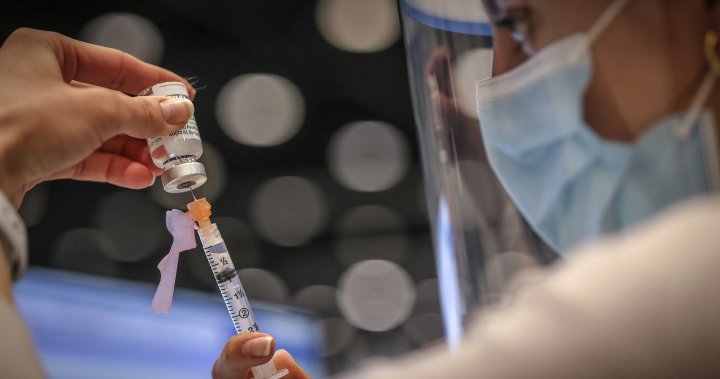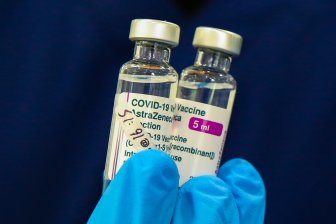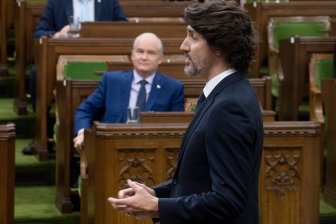Europe is starting to roll out its Digital COVID Certificate, a proof of COVID-19 vaccination program that could one day allow double-dosed Canadians to sip wine at a French vineyard without having to adhere to the piles of pandemic-related rules that exist now.
There’s just one problem: not all Canadian-approved COVID-19 vaccines are currently recognized by the program.
Read more:
Feds say Canada ‘needs to be part’ of vaccine passport talks as other countries race ahead
Canada has approved all the same vaccines as the European Union: Moderna, Pfizer, AstraZeneca and Janssen (Johnson & Johnson), the latter of which hasn’t been distributed to date.
However, while Canada has doled out both the European-made version of the AstraZeneca jab and its Indian-made counterpart – known as Covishield – Brussels has only approved the European-made version.

That means Canadians who received at least one dose of the Covishield vaccine might find themselves running into a roadblock as they try to book a trip to the E.U., should Europe’s internal passport program be extended to international travellers.
“My understanding is that the two AstraZeneca manufactured vaccines, European Union and India, are biologically identical,” said Kerry Bowman, a professor of bioethics and global health at the University of Toronto.
“So what we’ve got is a bureaucratic situation here that could well indeed stand in the way of people’s freedom of travel.”
In Canada, 1.6 million people have received a jab of the European-made version of AstraZeneca, according to the government’s figures. But another 272,000 people have been given at least one dose of the Covishield vaccine – leaving the future of their potential EU travel plans in limbo.
“This is one of the great problems with vaccine passports, is that we don’t have a great global infrastructure on how these things are going to be managed — and so decisions are being made in different places,” Bowman said.
Read more:
Expert urges Canada to ‘follow the science’ on COVID-19 vaccine passports
Part of the problem comes from AstraZeneca itself, according to the European Medicines Agency (EMA). The company hasn’t actually applied to have the European regulator approve its Covishield shot.
“Should we receive a marketing authorization application for Covishield or should any change to the approved manufacturing sites for (AstraZeneca’s vaccine) be approved, we would communicate about it,” said a spokesperson for the EMA in an email sent to Global News.

Given that the EU has already approved the European-made jab, it’s unlikely they’d reject the version made in India, according to experts. That’s because there are no significant differences between the European-made and Indian-made AstraZeneca vaccines.
“You do have to go through this very rigorous quality control process where you are assured that the same process was used and that the vaccine that you have at the end of your process is as good as the one that’s coming from another plant,” said Dr. Joanne Langley, a vaccine researcher with the Canadian Center for Vaccinology.
“If you are assured that all the quality control processes are in place and you’re using the same methods, the same source materials, you would think that it should be as effective from one plant to another.”
And while the current Digital COVID Certificate in the EU only applies to internal travel, the door remains open for member states to exercise a degree of autonomy when it comes to who they allow within their borders.
Read more:
UN agency details new ‘digital seal’ as countries mull COVID-19 vaccine passports
EU states “could accept vaccination certificates from non-EU countries,” according to an EU spokesperson, provided the certificates contain the minimum required data and can be properly verified.
But until this Covishield oversight is remedied, it’s not only Canadians who could find themselves stumbling over this bureaucratic hurdle to European travel.
Millions of people around the world have been given the Covishield vaccine, particularly in India, where the homegrown jab has played a huge role in the country’s vaccination efforts so far.
The head of India’s Serum Institute fired out a tweet pledging to tackle the issue on Monday.
“I realise that a lot of Indians who have taken COVISHIELD are facing issues with travel to the E.U.,” wrote Adar Poonawalla.
“I assure everyone, I have taken this up at the highest levels and hope to resolve this matter soon, both with regulators and at a diplomatic level with countries.”

The current exclusion of Covishield also has a disproportionate impact on countries with fewer resources at their disposal, as the vaccine-sharing program COVAX has distributed millions of AstraZeneca doses — many of which were the Covishield brand.
“This protectionism, I think it’s only hurtful in the long run,” said Dr. Anna Banerji, an infectious disease and global health specialist at the University of Toronto.
“It targets those countries that may be resource-poor through the COVAX program.”
She said that if countries like the United States limit their border reopenings to only those vaccinated with their approved vaccines — which are the Pfizer, Moderna and Janssen jabs — this “excludes much of the rest of the world.”
“That doesn’t make a lot of sense if they’re trying to open up the borders,” Banerji said.
Read more:
From vaccine passports to prices: Experts answer questions on the summer travel season
As early cracks begin to emerge in proof-of-vaccination strategies, the Canadian government says there’s a concerted global effort underway to ensure proof-of-vaccination rules make sense in an international context.
So far, Canada has stopped short of issuing an official plan for vaccine passports — but on June 18, Prime Minister Justin Trudeau said the federal government is “working with the provinces to establish a national certification of vaccination status that will be easily accepted around the world for people who need to travel internationally.”
He said these certifications are likely going to be available “for the fall.”
These discussions aren’t just underway with provinces. They’re taking place on the international stage, too, according to the Public Health Agency of Canada (PHAC).
“Proof of vaccination credentials are one potential tool that could be used to support the reopening of societies and economies,” said Tammy Jarbeau, a spokesperson for PHAC.
“Canada is participating in the international dialogue on this issue, specifically at the World Health Organization and through the G7.”

The patchwork of vaccine approvals around the world has made those discussions even more important, according to Canada’s top doctor.
“Every country has authorized different vaccines,” said Chief Public Health Officer Dr. Theresa Tam, speaking on June 17.
“They’re all making different policy decisions at the moment. So, I think the important thing is to engage in international discussions.”
As things stand now, Tam said Canada is “in the early days of resuming travel (while) taking into account someone’s vaccination status.”
“I think every one of us will do our best in looking at what can be achieved in the international discussions,” she said.
© 2021 Global News, a division of Corus Entertainment Inc.
















































